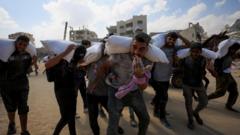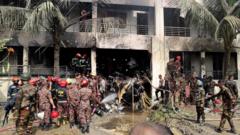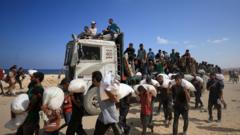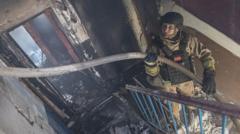In two tragic incidents over the weekend, Israeli soldiers fired upon Palestinians during food distributions in Gaza, demonstrating the perilous reality of humanitarian aid efforts. Both Israel-backed and U.N.-led initiatives have raised concerns over safety and governance, as citizens face dire food shortages and increasing violence.
Aid Distribution Dangers Highlighted by Recent Shootings in Gaza

Aid Distribution Dangers Highlighted by Recent Shootings in Gaza
A series of deadly incidents underscore the risks tied to food aid distributions amid ongoing conflicts in Gaza, revealing critical governance issues.
Over the weekend, a tragic series of events unfolded in Gaza, revealing the dire humanitarian crisis exacerbated by ongoing conflicts. Two separate incidents on consecutive days demonstrated the extreme risks civilians face when seeking food aid in a territory grappling with governance breakdown and military hostilities.
On Saturday, Israeli soldiers shot at civilians approaching food distribution points organized by Israel-backed private contractors. The following day, gunfire erupted again as Palestinians rushed to collect aid from a United Nations convoy directing food supplies toward areas dominated by Hamas. These occurrences illuminate not only the immediate danger present during aid distribution but also the broader challenges of hunger and governance that plague Gaza.
Supporters of the Israel-backed food distribution argue that it effectively prevents supplies from falling into the hands of Hamas and looters. In contrast, proponents of the U.N.-led initiatives asserted that the violence toward civilians exemplifies the failure of Israel's strategies. Critics of the former approach raise concerns that it forces desperate civilians into perilous situations by requiring them to cross Israeli military zones, significantly endangering their lives.
Three interconnected dynamics emerge from these incidents. Firstly, during both shootings, the Israeli military resorted to live ammunition for crowd control, raising questions about the adequacy of their non-lethal tactics. Secondly, civilians are increasingly inclined to risk their safety in search of food amidst widespread shortages due to an intensive Israeli blockade lasting over two months. Lastly, the absence of functional governance in most areas of Gaza has left residents without essential services, as Hamas is unable to manage social order or provide necessary support.
With Israel exerting control over vast majority of Gaza while simultaneously ousting Hamas leadership, there remains a contentious debate regarding the establishment of a transitional governance system. Critics argue that a long-term resolution requires addressing governance matters even while focusing on dismantling Hamas. Shira Efron, an expert on Gaza humanitarian issues, encapsulates the urgency of the situation by stating, "After 22 months of war, it’s anarchy in Gaza. Without addressing core issues, there won’t be a solution."
Israeli Prime Minister Benjamin Netanyahu maintains that the complete defeat of Hamas must precede any detailed discussions on post-war governance. However, many argue that without a comprehensive plan for what follows Hamas, the pathway to lasting peace and stability remains obscured.





















